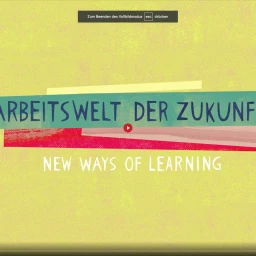The world of work is changing and companies are faced with the task of implementing necessary changes and developing innovative solutions to problems. A talk with Jenny Maertens, expert for transformation, innovation and new work.
You say that the success of transformation is in “people, leadership and culture”, which at the same time is one of the biggest challenges for many companies. How should an innovation-oriented culture be designed and how can companies approach such a culture?
For me, innovation means that companies are in tune with the time and solve problems for their customers. I have a design thinking background and this is basically about having empathy for customers’ problems of all kinds, dealing with them in a progressive way and solving them through new products, services and processes. I notice that this often doesn’t work in companies. There are a lot of ideas and projects are set up, but there is a lack of implementation. For me, an innovation-oriented culture means thinking entrepreneurially, being open to employees’ ideas and then implementing them.
What do you think are the reasons why ideas exist but are not implemented?
It’s often down to empowerment and mindset. It needs a culture where mistakes are allowed to be made, where people learn from their mistakes and where employees feel safe to openly express their opinions. It takes a learning organisation that continuously builds skills and provides employees with the tools to do so. And it requires a long-term agenda by management that signals the willingness to implement ideas in the organisation step by step.
„Ideas alone are useless if there is no implementing culture in the company or if employees are not perceived and supported.“ Jenny Maertens
Where are the levers for success in order to inspire employees and bind them to companies?
For me, the lever is leadership. This position needs people being interested in people and in their further development. People who inspire employees and enjoy being a leader. We have to get away from traditional role definitions. A good leader acts as a coach, guide and motivator, takes on personalities and builds a bond with employees and thus also with the company.
Since you belong to the Gen‑Z environment: What do young generations of employees expect by leadership?
Especially at the beginning of a job, they need guard rails and a lot of guidance from a manager. What am I allowed to do, what am I not allowed to do? A clear recognition of personal strengths and the commitment to being able to use them in the job and not to eliminate weaknesses through training. And above all, coaching, support, giving help when you don’t know what to do, and networking with others to get ahead. Young people want to learn, but they also need the right environment. Learning in organisations needs to be set up differently for this. Instant feedback, for example, is incredibly important, I’m thinking of the instant likes or comments on social media that Gen Z has grown up with. An end-of-year feedback session is not what Gen Z is thinking about.
Short film: Future world world of work – part 3

What is particularly important to Gen Z in terms of working conditions and environment?
My impression from practical experience is that many companies often understand “working conditions and environment” to mean flexibility, remote working and office design, because these topics are easy to grasp and are featured very strongly in the media. From many conversations, however, I do not perceive this as a top priority for young people. What is important to them is to have a say, for regulations and processes to make sense, and to be valued as a person and for their work. Gen Z attaches importance to being able to contribute as a person and to live their values. Young people want purpose, they want to feel good, they want to learn, get a decent salary and have a cool team. So it’s more about the culture of a company than about pure equipment. Nice office space with space that invites collaboration and creativity, good coffee are nice, but not the decisive factor if items such as appreciation, motivating leadership and further development are not in place.
„No one has to be sitting next to each other when everyone is writing a concept.“ Jenny Maertens
Companies are currently attempting to bring employees back to the office for at least part of their working hours. Can you relate to this and what is the most important aspect?
It is important to question the motives why the presence in the office is desired. Is it about space utilisation, control, productivity or is the office presence linked to work purpose? Regulations are always particularly well accepted when they are not rigid sets of rules, but when presence is decided at team level.
Jenny, thank you for talking with us.





